Sold Out!!!!!
We do have to cut back even possibly sell out due to our move.
Care and Feeding tips below....
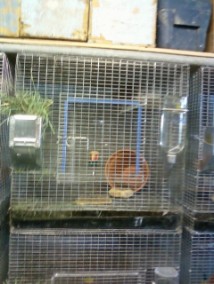
All Gone!!
If you think you might be interested in raising them let us know for a great deal.... Thanks!!
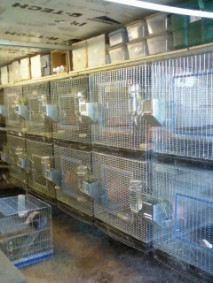
We added Chinchillas to our Barn they have been a great addition to our Menagerie..
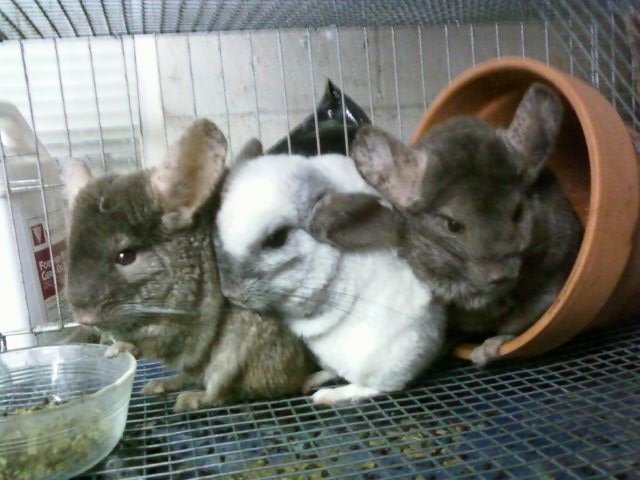

Chinchillas are beautiful and love to cuddle with one another we have ours in trios 2 Female,1 Male.
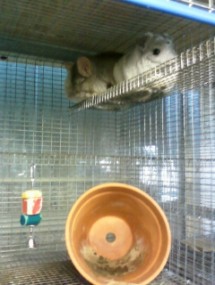
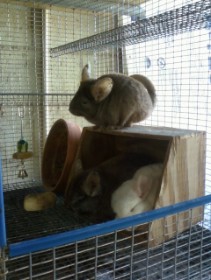
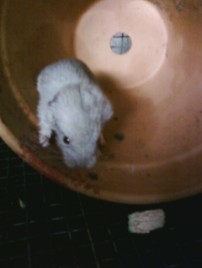
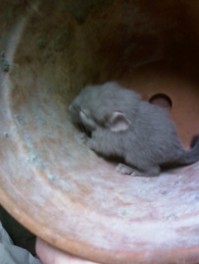
Beigh Some new additions to our Barn 2 baby male chinchillas Tan
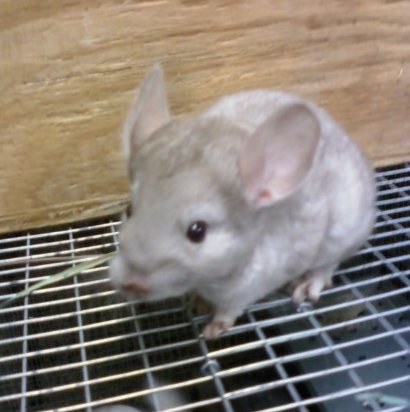
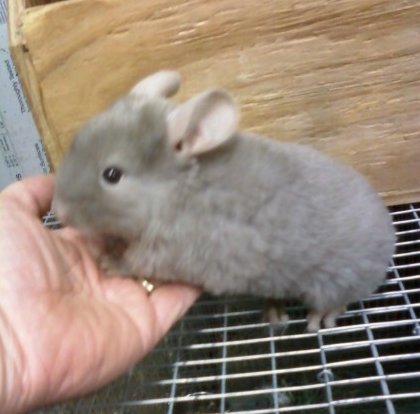
Water, Feed, Hay, and Supplements
Offer fresh clean water at all times. Sterilize water bottles in a dishwasher weekly. Clean the inside of bottles, tubes, and stoppers daily. Use distilled water if you are unsure of the bacteria/chlorine levels in your tap water. If you use automatic waterers, flush lines regularly. Chinchillas are far more susceptible to contaminants than people are. Be aware that baby chinchillas can drown in water bowls, so bottles with tubes are usually recommended. Give your chinchilla time to learn to use a bottle if it came from a place that used automatic watering systems or any other kind of watering source. Hang bottles in such a way that the chinchilla cannot chew the bottle or the cap. Chinchillas drink about 2 ounces of water a day, but it varies with age and pregnancy.
Feed an unlimited amount of fresh clean chinchilla pellets. Do not use feed that is over three months old, as its nutritional value begins to drop after this time. The most readily available quality feeds are
Oxbow Chinchilla Deluxe, Purina's Mazuri Chinchilla Diet Pellet, and Hubbard's Tradition Chinchilla Specialty Diet. Make sure the feed was milled no more than three months prior to purchase, and freeze any portion that won't be used immediately. Many breeders have their own feed milled, but most mills won't mill under a ton at a time for individual purchase. Chinchillas eat an average of 2 tablespoons of high quality pellets per day, but this amount can vary. Don't use rabbit feed. Do not feed chinchillas lettuce, and other vegetables. They can have 1-2 raisins or 1-2 sunflower seeds per day, but no more.Feed a fresh clean grass hay, like
western timothy, brome, orchard, or bermuda grass. Make sure the hay is free of mold and any other contaminants. Store the hay off the ground in a cool dry place that rodents cannot get to. Contamination by rats and mice is the primary source of chinchilla diseases. Chinchillas should have loose hay available at all times. Alfalfa, clover, vetch, and other legume hays are not advisable. Legume hays are much to high in protein for a regular part of the chinchilla's diet. Grass hay is readily available and very inexpensive.Some breeders choose to supplement the chinchilla's diet with Calf Manna. If you choose to do so, add 1 teaspoon per day per chinchilla in the feed as a supplement. Don't overfeed Calf Manna…more is not better. Do not mix the calf manna, or any supplement in with the regular feed. This will encourage "digging." Chinchillas can develop this digging habit, and dig through their entire feeder's worth of pellets looking for the supplement. One alternative is to use an automatic feeder with special sections built into the feeder for feed, and for supplement.
As an alternative to Calf Manna, you can make your own supplement. Feed no more than one teaspoon per day per chinchilla. Ingredients can be found at a local health food store, or at some feed stores. Supplements can also be fed by hand as a treat, but this practice may encourage nipping. Again, don't mix the supplement with the regular pellet feed.
Recipe #1
3 lbs. Rolled Oats
1 1/2 lbs. Red Wheat Bran
1 lb. Rolled Wheat
1 lb. Rolled Barley
1 lb. Wheat Germ
1/2 lb. Flax Seed
1/4 lb. Shelled unsalted raw Sunflower Seeds
Recipe #2
2 lbs. Rolled Oats
1 lb. Barley Flakes
1 lb. Cracked Wheat
1 lb. Red Wheat Bran
1 lb. Wheat Germ
1 lb. Flax Seed
1/4 lb. Shelled unsalted raw Sunflower Seeds
If other treats are fed, they should be done so sparingly. Acceptable treats are:
(pick only one per day or so)
1-2 raisins
1-2 sunflower seeds
1 very small slice of apple
1 very small slice of dried apricot (make sure they contain no sulfites, most do)
1 dried cranberry
You can feed a couple raisins to help alleviate constipation, or part of a plain shredded wheat biscuit to help alleviate diarrhea.
Handling and Temperament
Chinchillas vary distinctly in temperament, and this should be taken into consideration as they are handled or purchased. Some chinchillas will sit quietly when held if you support their back legs in one hand, and support their front feet slightly higher than the back with the other hand. They feel safer held up against you than with your hands outstretched. It is safe to hold a chinchilla temporarily by the base of the tail. Be careful not to grasp the fur where the tail connects to the body or you will have a handful of fur and a damaged coat. If they are frightened when you are holding them, they might slip their fur, or lose an area of fur down to the skin, as a defense mechanism. They might also bite if hurt or extremely frightened. Be careful not to squeeze them too tightly because their ribs are very easily broken.Young children should be supervised very closely when allowed to handle a chinchilla. It is common to have fingers bitten when children and adults stick their fingers through the cage wire and the chinchillas mistake this for an offering of food.